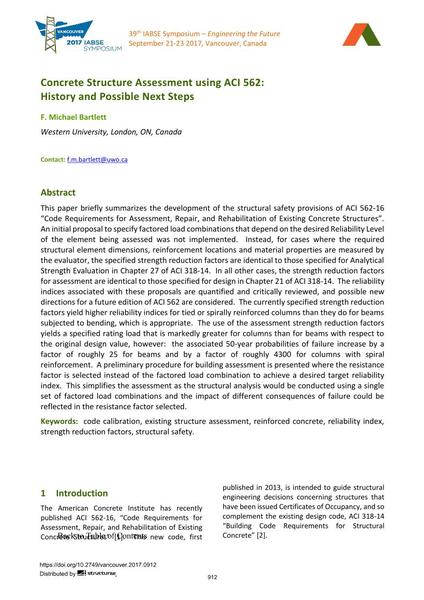Concrete Structure Assessment using ACI 562: History and Possible Next Steps

|
|
|||||||||||
Bibliographic Details
| Author(s): |
F. Michael Bartlett
(Western University, London, ON, Canada)
|
||||
|---|---|---|---|---|---|
| Medium: | conference paper | ||||
| Language(s): | English | ||||
| Conference: | IABSE Symposium: Engineering the Future, Vancouver, Canada, 21-23 September 2017 | ||||
| Published in: | IABSE Symposium Vancouver 2017 | ||||
|
|||||
| Page(s): | 912-919 | ||||
| Total no. of pages: | 8 | ||||
| Year: | 2017 | ||||
| DOI: | 10.2749/vancouver.2017.0912 | ||||
| Abstract: |
This paper briefly summarizes the development of the structural safety provisions of ACI 562-16 “Code Requirements for Assessment, Repair, and Rehabilitation of Existing Concrete Structures”. An initial proposal to specify factored load combinations that depend on the desired Reliability Level of the element being assessed was not implemented. Instead, for cases where the required structural element dimensions, reinforcement locations and material properties are measured by the evaluator, the specified strength reduction factors are identical to those specified for Analytical Strength Evaluation in Chapter 27 of ACI 318-14. In all other cases, the strength reduction factors for assessment are identical to those specified for design in Chapter 21 of ACI 318-14. The reliability indices associated with these proposals are quantified and critically reviewed, and possible new directions for a future edition of ACI 562 are considered. The currently specified strength reduction factors yield higher reliability indices for tied or spirally reinforced columns than they do for beams subjected to bending, which is appropriate. The use of the assessment strength reduction factors yields a specified rating load that is markedly greater for columns than for beams with respect to the original design value, however: the associated 50-year probabilities of failure increase by a factor of roughly 25 for beams and by a factor of roughly 4300 for columns with spiral reinforcement. A preliminary procedure for building assessment is presented where the resistance factor is selected instead of the factored load combination to achieve a desired target reliability index. This simplifies the assessment as the structural analysis would be conducted using a single set of factored load combinations and the impact of different consequences of failure could be reflected in the resistance factor selected. |
||||
| Keywords: |
structural safety reinforced concrete reliability index existing structure assessment code calibration strength reduction factors
|
||||
